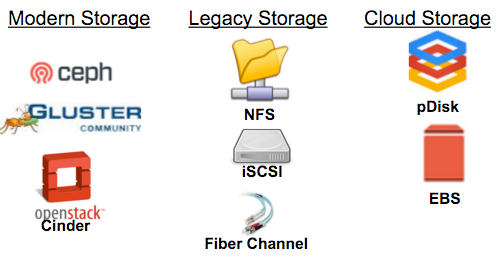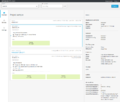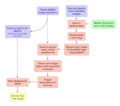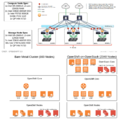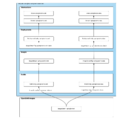欢迎大家赞助一杯啤酒🍺 我们准备了下酒菜:Formal mathematics/Isabelle/ML, Formal verification/Coq/ACL2, C++/F#/Lisp
OpenShift
来自开放百科 - 灰狐
(版本间的差异)
小 (→Kubernetes) |
小 (→图集) |
||
| (未显示1个用户的44个中间版本) | |||
| 第2行: | 第2行: | ||
OpenShift 3 使用 [[Docker]] 和 [[Kubernetes]] 帮助用户构建、部署和管理他们的应用。 | OpenShift 3 使用 [[Docker]] 和 [[Kubernetes]] 帮助用户构建、部署和管理他们的应用。 | ||
| + | |||
| + | ==简介== | ||
| + | OpenShift Origin 是一套[[Kubernetes]]企业分发版。 | ||
| + | |||
| + | ==功能== | ||
| + | [https://www.redhat.com/zh/resources/openshift-container-platform 功能和优势] | ||
| + | *开源技术:结合 docker 格式 Linux 容器、Kubernetes 及 其 他 开 源 技 术 ,帮 助 用 户 摆 脱 特定供应商技术锁定或业务规划束缚。 | ||
| + | *自助服务配置:开发人员可直接通过最常用的工具,轻松、快速、按需创建各种应用,同时还能让运营团队全面控制整个环境。 | ||
| + | *持久存储:红帽 OpenShift 容器平台支持持久存储,允许用户同时运行有状态的应用和无状态的云原生应用。 | ||
| + | *多语种支持:开发人员可轻松地在同一平台使用多种语言、框架和数据库工作。 | ||
| + | *自动化:红帽 OpenShift 容器平台自带多种功能,包括经过简化且可自动实施的应用构建、部署、扩展、运行状况管理等。 | ||
| + | *用户界面:开发人员可直接访问多种命令行工具、多设备 Web 控制台和基于 Eclipse 的整合开发环境(如红帽 JBoss®开发 人员工作室)。 | ||
| + | *运营管理:该产品所含的红帽 CloudForms 让用户能够实时了解单个容器和整个基础架构的运行情况。 | ||
| + | *深化协作:OpenShift 允许运营和开发人员在同一平台上使用各种容器,实现深入合作。 | ||
| + | *可扩展性:在 OpenShift 上运行的应用,可在数秒内轻松地扩展到数百个节点上的数千个实例中。 | ||
| + | *强大的生态系统:红帽的合作伙伴生态系统持续扩展,旨在为用户提供广泛多样集成。该系统中的第三方合作伙伴可提供额外的存储和网络提供商、集成开发环境 (IDE) 和 CI 整合、独立软件 供 应 商 (ISV) 解决方案等,均可以和 OpenShift 搭配使用。 | ||
| + | *容器可移植性:基于红帽应用编程接口 (API) 支持的、标准化 Linux 容 器 模 型构建。让 所有基于 OpenShift 上创建的应用都能在支持 docker 格式容器的任意环境中轻松运行。 | ||
| + | *自由选择云架构:按照您的特定需求,选择在物理或虚拟、公共、私有甚至混合云基础架构上运行应用。 | ||
==版本== | ==版本== | ||
| + | *[https://docs.openshift.com/container-platform/4.6/release_notes/ocp-4-6-release-notes.html OpenShift Container Platform 4.6 release notes] | ||
| + | *[https://blog.openshift.com/announcing-the-openshift-container-platform-3-5-ga/ Announcing the OpenShift Container Platform 3.5 GA] | ||
*[https://blog.openshift.com/announcing-the-release-of-openshift-origin-v4/ Announcing the Release of OpenShift Origin V4] | *[https://blog.openshift.com/announcing-the-release-of-openshift-origin-v4/ Announcing the Release of OpenShift Origin V4] | ||
*What's New in OpenShift 3.3 – [https://blog.openshift.com/whats-new-openshift-3-3-cluster-management/ Cluster Management] [https://blog.openshift.com/whats-new-openshift-3-3-web-console/ Web Console] [https://blog.openshift.com/whats-new-openshift-3-3-enterprise-container-registry/ Enterprise Container Registry] [https://blog.openshift.com/whats-new-openshift-3-3-developer-experience/ Developer Experience] | *What's New in OpenShift 3.3 – [https://blog.openshift.com/whats-new-openshift-3-3-cluster-management/ Cluster Management] [https://blog.openshift.com/whats-new-openshift-3-3-web-console/ Web Console] [https://blog.openshift.com/whats-new-openshift-3-3-enterprise-container-registry/ Enterprise Container Registry] [https://blog.openshift.com/whats-new-openshift-3-3-developer-experience/ Developer Experience] | ||
| 第19行: | 第39行: | ||
==安装== | ==安装== | ||
| + | ===Docker=== | ||
| + | $ sudo docker run -d --name "origin" \ | ||
| + | --privileged --pid=host --net=host \ | ||
| + | -v /:/rootfs:ro -v /var/run:/var/run:rw -v /sys:/sys -v /sys/fs/cgroup:/sys/fs/cgroup:rw \ | ||
| + | -v /var/lib/docker:/var/lib/docker:rw \ | ||
| + | -v /var/lib/origin/openshift.local.volumes:/var/lib/origin/openshift.local.volumes:rslave \ | ||
| + | openshift/origin start | ||
| + | $ sudo docker exec -it origin bash | ||
| + | |||
| + | ===Ubuntu=== | ||
| + | [https://www.howtoforge.com/how-to-install-and-configure-openshift-origin-paas-server-on-ubuntu-2004/ How to Install and Configure OpenShift Origin PaaS Server on Ubuntu 20.04] | ||
| + | |||
| + | ===macOS=== | ||
| + | 使用[[Homebrew]] | ||
| + | $ brew cask install minishift | ||
| + | $ brew cask install --force minishift | ||
| + | |||
| + | ===其它=== | ||
| + | *[https://github.com/kubernetes/minikube Minikube] Run [[Kubernetes]] locally | ||
| + | *[https://github.com/minishift/minishift Minishift] Run OpenShift locally | ||
| + | |||
| + | 使用[https://docs.openshift.org/latest/minishift Minishift]快速部署,使用[https://github.com/mist64/xhyve xhyve] hypervisor启动本地OpenShift集群。 | ||
| + | $ brew install --HEAD xhyve | ||
| + | $ brew cask install minishift | ||
| + | $ brew install docker-machine-driver-xhyve | ||
| + | $ sudo chown root:wheel $(brew --prefix)/opt/docker-machine-driver-xhyve/bin/docker-machine-driver-xhyve | ||
| + | $ sudo chmod u+s $(brew --prefix)/opt/docker-machine-driver-xhyve/bin/docker-machine-driver-xhyve | ||
| + | $ minishift start | ||
| + | $ minishift ip | ||
| + | $ minishift oc-env | ||
| + | $ oc new-app https://github.com/openshift/nodejs-ex -l name=myapp | ||
| + | $ oc logs -f bc/nodejs-ex | ||
| + | $ oc expose svc/nodejs-ex | ||
| + | $ minishift openshift service nodejs-ex --in-browser | ||
| + | $ minishift image list --vm | ||
| + | $ minishift addons list | ||
| + | $ minishift stop | ||
| + | |||
| + | 或 [https://github.com/openshift/origin-server/blob/master/documentation/oo_deployment_guide_vm.adoc OpenShift Origin Virtual Machine Deployment Guide] | ||
| + | |||
在一个空目录下: | 在一个空目录下: | ||
$ vagrant init openshift/origin-all-in-one | $ vagrant init openshift/origin-all-in-one | ||
| 第48行: | 第108行: | ||
router 172.30.233.69 <none> 80/TCP router=router 67d | router 172.30.233.69 <none> 80/TCP router=router 67d | ||
https://localhost:8443/console | https://localhost:8443/console | ||
| + | https://localhost:8443/swaggerapi/api/v1 | ||
| + | https://localhost:8443/swaggerapi/oapi/v1 | ||
system/admin | system/admin | ||
test/test | test/test | ||
| 第58行: | 第120行: | ||
[https://install.openshift.com/ Install OpenShift Today!] | [https://install.openshift.com/ Install OpenShift Today!] | ||
| − | == | + | ==生态系统== |
| + | [[OpenShift ecosystem]] | ||
| + | |||
| + | 语言支持 | ||
===Python=== | ===Python=== | ||
*[https://blog.openshift.com/getting-started-python/ Getting Started With Python] you can easily deploy and run Python applications. | *[https://blog.openshift.com/getting-started-python/ Getting Started With Python] you can easily deploy and run Python applications. | ||
| 第113行: | 第178行: | ||
==Commons== | ==Commons== | ||
[http://commons.openshift.org/ OpenShift Commons] | [http://commons.openshift.org/ OpenShift Commons] | ||
| + | *[https://commons.openshift.org/sig/Operations.html OpenShift Ops] | ||
| + | *[https://commons.openshift.org/sig/OpenshiftMachineLearning.html Machine Learning on OpenShift] | ||
| + | *[https://commons.openshift.org/sig/OpenshiftEDU.html OpenShift .EDU] | ||
| + | *[https://commons.openshift.org/sig/OpenshiftImageBuilders.html OpenShift Image Builders] | ||
| + | *[https://commons.openshift.org/sig/OpenshiftBigData.html OpenShift Big Data] | ||
| + | *[https://commons.openshift.org/sig/Openshift.NET.html OpenShift .NET] | ||
| + | *[https://commons.openshift.org/sig/OpenshiftOpenstack.html OpenShift on OpenStack] | ||
| + | *[https://commons.openshift.org/sig/OpenshiftGOV.html OpenShift .GOV] | ||
| + | *[https://commons.openshift.org/sig/OpenshiftAutomotive.html OpenShift in Automotive] | ||
| + | *[https://commons.openshift.org/sig/OpenshiftMobile.html Mobile on OpenShift] | ||
| + | *[https://commons.openshift.org/sig/OpenshiftOperators.html Operator Framework] | ||
==[[Kubernetes]]== | ==[[Kubernetes]]== | ||
| 第118行: | 第194行: | ||
*[https://blog.openshift.com/red-hat-chose-kubernetes-openshift/ Why Red Hat Chose Kubernetes for OpenShift] | *[https://blog.openshift.com/red-hat-chose-kubernetes-openshift/ Why Red Hat Chose Kubernetes for OpenShift] | ||
*[https://blog.openshift.com/enterprise-ready-kubernetes/ What is Enterprise-Ready Kubernetes?] | *[https://blog.openshift.com/enterprise-ready-kubernetes/ What is Enterprise-Ready Kubernetes?] | ||
| + | |||
| + | ==[[Prometheus]]== | ||
| + | 系统监控、告警、pull metrics and push alters、时序数据库。 | ||
| + | *[https://prometheus.io/docs/instrumenting/exporters/ Exporters and integrations] 支持和集成大量第三方产品和服务 | ||
| + | *[https://blog.openshift.com/prometheus-1-0-openshift-postgresql-metrics-collection/ Prometheus 1.0 on OpenShift: PostgreSQL Metrics Collection] | ||
==[[OpenStack]]== | ==[[OpenStack]]== | ||
| 第125行: | 第206行: | ||
*[https://blog.openshift.com/setting-openshift-3-openstack/ Setting up OpenShift 3 on OpenStack] | *[https://blog.openshift.com/setting-openshift-3-openstack/ Setting up OpenShift 3 on OpenStack] | ||
| − | ==[[Continuous integration|CI]]/[[Continuous delivery|CD]]== | + | ==[[Continuous integration|CI]]/[[Continuous delivery|CD]]/[[Jenkins]]== |
| + | *[https://github.com/openshift/jenkins-plugin OpenShift V3 Plugin for Jenkins] | ||
*[https://github.com/openshift/jenkins Jenkins Docker Image] | *[https://github.com/openshift/jenkins Jenkins Docker Image] | ||
*[https://blog.openshift.com/cicd-with-openshift/ CI/CD with OpenShift] | *[https://blog.openshift.com/cicd-with-openshift/ CI/CD with OpenShift] | ||
| 第131行: | 第213行: | ||
*[https://blog.openshift.com/openshift-cloudbees-jenkins-enterprise-devops/ OpenShift Ecosystem: Ultimate DevOps with CloudBees Jenkins Enterprise and OpenShift] | *[https://blog.openshift.com/openshift-cloudbees-jenkins-enterprise-devops/ OpenShift Ecosystem: Ultimate DevOps with CloudBees Jenkins Enterprise and OpenShift] | ||
*[https://blog.openshift.com/openshift-ecosystem-continuous-integration-diamanti/ OpenShift Ecosystem: Continuous Integration with Diamanti] | *[https://blog.openshift.com/openshift-ecosystem-continuous-integration-diamanti/ OpenShift Ecosystem: Continuous Integration with Diamanti] | ||
| − | |||
*[https://github.com/jenkinsci/pipeline-plugin Jenkins Pipeline plugin] | *[https://github.com/jenkinsci/pipeline-plugin Jenkins Pipeline plugin] | ||
*[https://github.com/jenkinsci/kubernetes-plugin jenkins-kubernetes-plugin] | *[https://github.com/jenkinsci/kubernetes-plugin jenkins-kubernetes-plugin] | ||
*[https://blog.openshift.com/jenkins-slaves-in-openshift-using-an-external-jenkins-environment/ Jenkins Slaves in OpenShift Using an External Jenkins Environment] | *[https://blog.openshift.com/jenkins-slaves-in-openshift-using-an-external-jenkins-environment/ Jenkins Slaves in OpenShift Using an External Jenkins Environment] | ||
[https://blog.openshift.com/category/technologies/jenkins/ 更多有关 OpenShift with Jenkins的文章>>>] | [https://blog.openshift.com/category/technologies/jenkins/ 更多有关 OpenShift with Jenkins的文章>>>] | ||
| + | |||
| + | ==[[Akka]]== | ||
| + | *[https://blog.openshift.com/building-distributed-and-event-driven-applications-in-java-or-scala-with-akka-on-openshift/ Building Distributed and Event-driven Applications in Java or Scala With Akka on OpenShift] | ||
| + | |||
| + | ==[[Apache Spark]]== | ||
| + | [https://trello.com/c/vythDBcQ/51-spark-on-openshift Spark on OpenShift] | ||
| + | *[https://github.com/kubernetes/kubernetes/tree/master/examples/spark Apache Spark cluster using Kubernetes and Docker] | ||
| + | |||
| + | ==[[Apache Kafka]]== | ||
| + | *[https://github.com/strimzi/strimzi Kafka as a Service] running on [[Kubernetes]] and OpenShift | ||
| + | |||
| + | ==Casandra== | ||
| + | *[https://github.com/openshift/origin-metrics Origin Metrics]使用[[Apache Cassandra|Casandra]]做metric datastore。 | ||
==[[Ansible]]== | ==[[Ansible]]== | ||
| 第143行: | 第237行: | ||
==[[API]]/[[Nginx]]== | ==[[API]]/[[Nginx]]== | ||
*[https://blog.openshift.com/openshift-ecosystem-implementing-the-nginx-proxy-model-on-red-hat-openshift/ OpenShift Ecosystem: Implementing the NGINX Proxy Model on Red Hat OpenShift] | *[https://blog.openshift.com/openshift-ecosystem-implementing-the-nginx-proxy-model-on-red-hat-openshift/ OpenShift Ecosystem: Implementing the NGINX Proxy Model on Red Hat OpenShift] | ||
| − | *[https://www.nginx.com/blog/building-microservices-using-an-api-gateway/ | + | *[https://www.nginx.com/blog/building-microservices-using-an-api-gateway/ Building Microservices: Using an API Gateway] |
*[https://blog.openshift.com/openshift-ecosystem-api-management-on-red-hat-openshift-with-3scale/ OpenShift Ecosystem: API Management on Red Hat OpenShift with 3scale] | *[https://blog.openshift.com/openshift-ecosystem-api-management-on-red-hat-openshift-with-3scale/ OpenShift Ecosystem: API Management on Red Hat OpenShift with 3scale] | ||
| + | |||
| + | ==[[Jupyter]]== | ||
| + | *[https://blog.openshift.com/jupyter-openshift-using-openshift-data-analytics/ Jupyter on OpenShift: Using OpenShift for Data Analytics] | ||
| + | *[https://blog.openshift.com/jupyter-openshift-part-2-using-jupyter-project-images/ Jupyter on OpenShift Part 2: Using Jupyter Project Images] | ||
| + | *[https://blog.openshift.com/jupyter-on-openshift-part-3-creating-a-s2i-builder-image/ Jupyter on OpenShift Part 3: Creating a S2I Builder Image] | ||
| + | *[https://blog.openshift.com/jupyter-on-openshift-part-4-adding-a-persistent-workspace/ Jupyter on OpenShift Part 4: Adding a Persistent Workspace] | ||
| + | *[https://blog.openshift.com/jupyter-on-openshift-part-5-ad-hoc-package-installation/ Jupyter on OpenShift Part 5: Ad-hoc Package Installation] | ||
| + | *[https://blog.openshift.com/jupyter-on-openshift-part-6-running-as-an-assigned-user-id/ Jupyter on OpenShift Part 6: Running as an Assigned User ID] | ||
| + | *[https://blog.openshift.com/jupyter-on-openshift-part-7-adding-the-image-to-the-catalog/ Jupyter on OpenShift Part 7: Adding the Image to the Catalog] | ||
==用户== | ==用户== | ||
| 第150行: | 第253行: | ||
*[http://docs.huihoo.com/redhat/summit/2015/12206_amadeus-uses-next-generation-containerized-application-platform-with-openshift.pdf OpenShift @ Amadeus] | *[http://docs.huihoo.com/redhat/summit/2015/12206_amadeus-uses-next-generation-containerized-application-platform-with-openshift.pdf OpenShift @ Amadeus] | ||
*[http://docs.huihoo.com/redhat/summit/2015/12775_cisco-delivers-a-highly-available-platform-using-openshift-enterprise-by-red-hat.pdf Cisco Delivers a Highly Available Platform using OpenShift by Red Hat] | *[http://docs.huihoo.com/redhat/summit/2015/12775_cisco-delivers-a-highly-available-platform-using-openshift-enterprise-by-red-hat.pdf Cisco Delivers a Highly Available Platform using OpenShift by Red Hat] | ||
| + | |||
| + | ==开发者== | ||
| + | [[OpenShift/developer|OpenShift开发者]] | ||
==文档== | ==文档== | ||
| + | *[http://docs.huihoo.com/openshift/idc-business-value-of-red-hat-openshift-zh-cn.pdf 红帽 OpenShift 的业务价值] | ||
| + | *[http://docs.huihoo.com/openshift/openshift-deliver-apps-faster-paas-devops-and-application-integration-zh-cn.pdf 平台即服务、DevOps和应用集成:加速交付应用新途径] | ||
*[http://docs.huihoo.com/openshift/OpenShift-3-Technical-Architecture.pdf OpenShift 3 Technical Architecture] | *[http://docs.huihoo.com/openshift/OpenShift-3-Technical-Architecture.pdf OpenShift 3 Technical Architecture] | ||
*[http://docs.huihoo.com/redhat/summit/2015/13544_openshift-3-the-next-generation-of-paas.pdf OpenShift 3 and The Next Generation of PaaS] | *[http://docs.huihoo.com/redhat/summit/2015/13544_openshift-3-the-next-generation-of-paas.pdf OpenShift 3 and The Next Generation of PaaS] | ||
*[http://docs.huihoo.com/redhat/summit/2015/12218_use-openshift-paas-to-accelerate-devops-continuous-delivery.pdf Using OpenShift & PaaS to accelerate DevOps & Continuous Delivery] | *[http://docs.huihoo.com/redhat/summit/2015/12218_use-openshift-paas-to-accelerate-devops-continuous-delivery.pdf Using OpenShift & PaaS to accelerate DevOps & Continuous Delivery] | ||
| + | |||
| + | ==图书== | ||
| + | *[https://book.huihoo.com/pdf/DevOps-with-OpenShift.pdf 《DevOps with OpenShift》] | ||
==图集== | ==图集== | ||
<gallery> | <gallery> | ||
| + | image:OpenShift-v3.png|OpenShift v3 | ||
| + | image:OpenShift-Origin-Architecture.png|OpenShift v3架构 | ||
| + | image:OpenShift-v3-Architecture.png|OpenShift v3架构 | ||
image:openshift-products.png|产品策略 | image:openshift-products.png|产品策略 | ||
image:Red-Hat-Container-Stack.png|红帽容器堆栈 | image:Red-Hat-Container-Stack.png|红帽容器堆栈 | ||
| + | image:OpenShift-is-Enterprise-Ready-Kubernetes.jpg|Kubernetes | ||
image:OpenShift-Enterprise-Container-Registry.png|企业容器注册 | image:OpenShift-Enterprise-Container-Registry.png|企业容器注册 | ||
image:openshift-support-platforms.png|支持平台 | image:openshift-support-platforms.png|支持平台 | ||
| 第189行: | 第304行: | ||
image:iot-data-analytics-on-openshift.png|IoT数据分析 | image:iot-data-analytics-on-openshift.png|IoT数据分析 | ||
image:3scale-Dockerized-nginx-based-API-gateway-on-OpenShift-v3.png|API网关 | image:3scale-Dockerized-nginx-based-API-gateway-on-OpenShift-v3.png|API网关 | ||
| + | image:deploying-2048-openshift-nodes-cncf-cluster.png|OpenStack(2048 Nodes) | ||
| + | image:openshift-on-openstack.png|OpenStack | ||
| + | image:OpenShift-Template-SpringBoot-Microservices.png|SpringBoot模板 | ||
</gallery> | </gallery> | ||
==链接== | ==链接== | ||
*[https://www.openshift.com/ OpenShift官网] | *[https://www.openshift.com/ OpenShift官网] | ||
| + | *[https://www.okd.io/ OKD] | ||
| + | *[https://www.redhat.com/zh/technologies/cloud-computing/openshift 红帽OpenShift] | ||
*[https://github.com/Friz-zy/awesome-linux-containers Awesome Linux Containers] [[image:awesome.png]] | *[https://github.com/Friz-zy/awesome-linux-containers Awesome Linux Containers] [[image:awesome.png]] | ||
*[https://blog.openshift.com OpenShift官方博客] | *[https://blog.openshift.com OpenShift官方博客] | ||
*[https://github.com/openshift OpenShift @ GitHub] | *[https://github.com/openshift OpenShift @ GitHub] | ||
*[https://github.com/openshift/origin OpenShift Origin] | *[https://github.com/openshift/origin OpenShift Origin] | ||
| + | *[https://ci.openshift.redhat.com/roadmap_overview.html OpenShift CI] | ||
*[https://www.openshift.com/enterprise/ OpenShift Enterprise] | *[https://www.openshift.com/enterprise/ OpenShift Enterprise] | ||
| + | *[https://trello.com/atomicopenshift AtomicOpenShift @ Trello] | ||
*[http://docs.huihoo.com/openshift/ OpenShift文档] | *[http://docs.huihoo.com/openshift/ OpenShift文档] | ||
*[https://developers.openshift.com/ OpenShift Developer Portal] | *[https://developers.openshift.com/ OpenShift Developer Portal] | ||
| 第207行: | 第329行: | ||
[[category:cloud computing]] | [[category:cloud computing]] | ||
| − | |||
[[category:go]] | [[category:go]] | ||
[[category:docker]] | [[category:docker]] | ||
[[category:kubernetes]] | [[category:kubernetes]] | ||
[[category:microservices]] | [[category:microservices]] | ||
| + | [[category:continuous integration]] | ||
| + | [[category:continuous delivery]] | ||
[[category:marketplace]] | [[category:marketplace]] | ||
[[category:Red Hat]] | [[category:Red Hat]] | ||
2021年7月24日 (六) 04:48的最后版本
OpenShift 是 Red Hat 推出的 Platform as a Service (PaaS) 开源云平台。
OpenShift 3 使用 Docker 和 Kubernetes 帮助用户构建、部署和管理他们的应用。
[编辑] 简介
OpenShift Origin 是一套Kubernetes企业分发版。
[编辑] 功能
- 开源技术:结合 docker 格式 Linux 容器、Kubernetes 及 其 他 开 源 技 术 ,帮 助 用 户 摆 脱 特定供应商技术锁定或业务规划束缚。
- 自助服务配置:开发人员可直接通过最常用的工具,轻松、快速、按需创建各种应用,同时还能让运营团队全面控制整个环境。
- 持久存储:红帽 OpenShift 容器平台支持持久存储,允许用户同时运行有状态的应用和无状态的云原生应用。
- 多语种支持:开发人员可轻松地在同一平台使用多种语言、框架和数据库工作。
- 自动化:红帽 OpenShift 容器平台自带多种功能,包括经过简化且可自动实施的应用构建、部署、扩展、运行状况管理等。
- 用户界面:开发人员可直接访问多种命令行工具、多设备 Web 控制台和基于 Eclipse 的整合开发环境(如红帽 JBoss®开发 人员工作室)。
- 运营管理:该产品所含的红帽 CloudForms 让用户能够实时了解单个容器和整个基础架构的运行情况。
- 深化协作:OpenShift 允许运营和开发人员在同一平台上使用各种容器,实现深入合作。
- 可扩展性:在 OpenShift 上运行的应用,可在数秒内轻松地扩展到数百个节点上的数千个实例中。
- 强大的生态系统:红帽的合作伙伴生态系统持续扩展,旨在为用户提供广泛多样集成。该系统中的第三方合作伙伴可提供额外的存储和网络提供商、集成开发环境 (IDE) 和 CI 整合、独立软件 供 应 商 (ISV) 解决方案等,均可以和 OpenShift 搭配使用。
- 容器可移植性:基于红帽应用编程接口 (API) 支持的、标准化 Linux 容 器 模 型构建。让 所有基于 OpenShift 上创建的应用都能在支持 docker 格式容器的任意环境中轻松运行。
- 自由选择云架构:按照您的特定需求,选择在物理或虚拟、公共、私有甚至混合云基础架构上运行应用。
[编辑] 版本
- OpenShift Container Platform 4.6 release notes
- Announcing the OpenShift Container Platform 3.5 GA
- Announcing the Release of OpenShift Origin V4
- What's New in OpenShift 3.3 – Cluster Management Web Console Enterprise Container Registry Developer Experience
- Origin 1.1 and OpenShift 3.1
- OpenShift V3 Deep Dive Tutorial | The Next Generation of PaaS
- Origin 1.0 and OpenShift 3
[编辑] 产品
- OpenShift Origin:开源云PaaS
- OpenShift Online:公有云PaaS
- OpenShift Enterprise:私有云PaaS
[编辑] 标准
[编辑] 安装
[编辑] Docker
$ sudo docker run -d --name "origin" \
--privileged --pid=host --net=host \
-v /:/rootfs:ro -v /var/run:/var/run:rw -v /sys:/sys -v /sys/fs/cgroup:/sys/fs/cgroup:rw \
-v /var/lib/docker:/var/lib/docker:rw \
-v /var/lib/origin/openshift.local.volumes:/var/lib/origin/openshift.local.volumes:rslave \
openshift/origin start
$ sudo docker exec -it origin bash
[编辑] Ubuntu
How to Install and Configure OpenShift Origin PaaS Server on Ubuntu 20.04
[编辑] macOS
使用Homebrew
$ brew cask install minishift $ brew cask install --force minishift
[编辑] 其它
- Minikube Run Kubernetes locally
- Minishift Run OpenShift locally
使用Minishift快速部署,使用xhyve hypervisor启动本地OpenShift集群。
$ brew install --HEAD xhyve $ brew cask install minishift $ brew install docker-machine-driver-xhyve $ sudo chown root:wheel $(brew --prefix)/opt/docker-machine-driver-xhyve/bin/docker-machine-driver-xhyve $ sudo chmod u+s $(brew --prefix)/opt/docker-machine-driver-xhyve/bin/docker-machine-driver-xhyve $ minishift start $ minishift ip $ minishift oc-env $ oc new-app https://github.com/openshift/nodejs-ex -l name=myapp $ oc logs -f bc/nodejs-ex $ oc expose svc/nodejs-ex $ minishift openshift service nodejs-ex --in-browser $ minishift image list --vm $ minishift addons list $ minishift stop
或 OpenShift Origin Virtual Machine Deployment Guide
在一个空目录下:
$ vagrant init openshift/origin-all-in-one $ vagrant up --provider=virtualbox
升级
$ vagrant up $ vagrant box update --box openshift/origin-all-in-one $ vagrant destroy --force $ vagrant up --provider=virtualbox
卸载
$ vagrant halt $ vagrant destroy --force $ vagrant box remove --force openshift/origin-all-in-one
下载oc,并加入path
oc version
之前版本安装步骤:
下载OpenShift Vagrant VirtualBox VM快速体验,可从百度云盘下载2.8G的镜像文件。
vagrant box add openshift3 openshift-bootstrap-1.1.box vagrant up vagrant ssh passwd 输入新密码,如:huihoo.io oc version oc get svc NAME CLUSTER_IP EXTERNAL_IP PORT(S) SELECTOR AGE docker-registry 172.30.236.154 <none> 5000/TCP docker-registry=default 67d kubernetes 172.30.0.1 <none> 443/TCP,53/UDP,53/TCP <none> 67d router 172.30.233.69 <none> 80/TCP router=router 67d https://localhost:8443/console https://localhost:8443/swaggerapi/api/v1 https://localhost:8443/swaggerapi/oapi/v1 system/admin test/test
Using OpenShift 3 on your local environment
- 运行一个Docker容器
- 下载二进制包
- 编译源代码
[编辑] 生态系统
语言支持
[编辑] Python
- Getting Started With Python you can easily deploy and run Python applications.
[编辑] Go
[编辑] Java
[编辑] Web Console
[编辑] 网络
[编辑] 存储
OpenShift的存储应该是其一大亮点。
OpenShift 支持以下的 PersistentVolume 插件:
- NFS
- HostPath (single node testing only)
- GlusterFS
- Ceph RBD
- OpenStack Cinder
- AWS Elastic Block Store (EBS)
- GCE Persistent Disk
- iSCSI
- Fibre Channel
[编辑] 区块链
[编辑] IoT
[编辑] OpenShift PEPs
- OpenShift PEP 010: Cartridge V3 and Docker Containers
- OpenShift PEP 013: OpenShift 3.x System Design
[编辑] Application
[编辑] Source-To-Image(S2I)
[编辑] Marketplace
[编辑] Commons
- OpenShift Ops
- Machine Learning on OpenShift
- OpenShift .EDU
- OpenShift Image Builders
- OpenShift Big Data
- OpenShift .NET
- OpenShift on OpenStack
- OpenShift .GOV
- OpenShift in Automotive
- Mobile on OpenShift
- Operator Framework
[编辑] Kubernetes
[编辑] Prometheus
系统监控、告警、pull metrics and push alters、时序数据库。
- Exporters and integrations 支持和集成大量第三方产品和服务
- Prometheus 1.0 on OpenShift: PostgreSQL Metrics Collection
[编辑] OpenStack
- OpenShift on OpenStack
- Introducing OpenShift on OpenStack Special Interest Group
- Docker on OpenStack
- Setting up OpenShift 3 on OpenStack
[编辑] CI/CD/Jenkins
- OpenShift V3 Plugin for Jenkins
- Jenkins Docker Image
- CI/CD with OpenShift
- Pipelines with Jenkins 2 on OpenShift
- OpenShift Ecosystem: Ultimate DevOps with CloudBees Jenkins Enterprise and OpenShift
- OpenShift Ecosystem: Continuous Integration with Diamanti
- Jenkins Pipeline plugin
- jenkins-kubernetes-plugin
- Jenkins Slaves in OpenShift Using an External Jenkins Environment
更多有关 OpenShift with Jenkins的文章>>>
[编辑] Akka
[编辑] Apache Spark
[编辑] Apache Kafka
- Kafka as a Service running on Kubernetes and OpenShift
[编辑] Casandra
- Origin Metrics使用Casandra做metric datastore。
[编辑] Ansible
[编辑] API/Nginx
- OpenShift Ecosystem: Implementing the NGINX Proxy Model on Red Hat OpenShift
- Building Microservices: Using an API Gateway
- OpenShift Ecosystem: API Management on Red Hat OpenShift with 3scale
[编辑] Jupyter
- Jupyter on OpenShift: Using OpenShift for Data Analytics
- Jupyter on OpenShift Part 2: Using Jupyter Project Images
- Jupyter on OpenShift Part 3: Creating a S2I Builder Image
- Jupyter on OpenShift Part 4: Adding a Persistent Workspace
- Jupyter on OpenShift Part 5: Ad-hoc Package Installation
- Jupyter on OpenShift Part 6: Running as an Assigned User ID
- Jupyter on OpenShift Part 7: Adding the Image to the Catalog
[编辑] 用户
[编辑] 开发者
[编辑] 文档
- 红帽 OpenShift 的业务价值
- 平台即服务、DevOps和应用集成:加速交付应用新途径
- OpenShift 3 Technical Architecture
- OpenShift 3 and The Next Generation of PaaS
- Using OpenShift & PaaS to accelerate DevOps & Continuous Delivery
[编辑] 图书
[编辑] 图集
[编辑] 链接
- OpenShift官网
- OKD
- 红帽OpenShift
- Awesome Linux Containers

- OpenShift官方博客
- OpenShift @ GitHub
- OpenShift Origin
- OpenShift CI
- OpenShift Enterprise
- AtomicOpenShift @ Trello
- OpenShift文档
- OpenShift Developer Portal
- OpenShift负责人谈PaaS、Docker、Kubernetes及与CloudFoundry的竞争
- Building on Kubernetes: Bringing Google-Scale Container Orchestration and Management to the Enterprise
- OpenShift, Kubernetes, Docker and Apache Hadoop YARN
- OpenShift V3 Deep Dive Tutorial | The Next Generation of PaaS
- 开源巨头Red Hat发布首个OpenShift区块链倡议
分享您的观点



